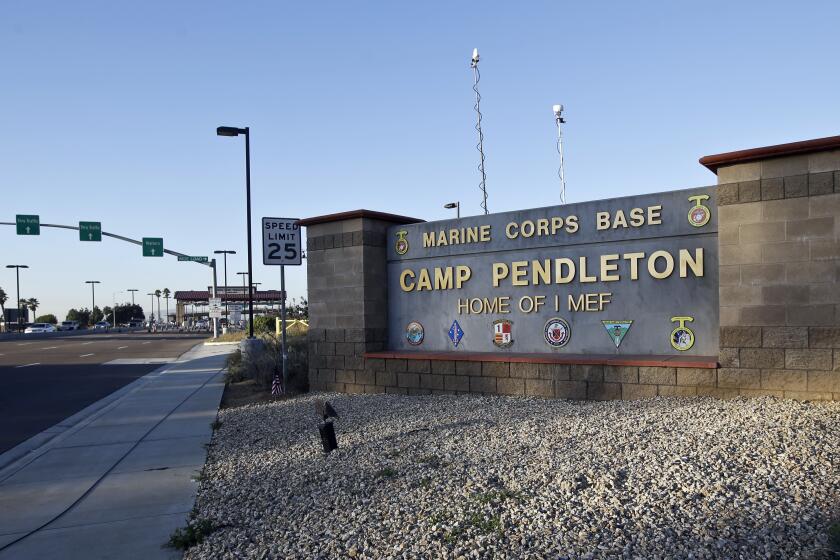Won battle, lost war in cellphone search case
David Riley’s appeal led to a landmark ruling on a major issue. But it didn’t help his case.
When the U.S. Supreme Court ruled last year that law enforcement must get a warrant to search cellphones, the historic opinion changed police protocol across the nation and set a strong precedent supporting privacy in a technological era.
As far as rulings go, the one in Riley v. California was a game changer – for nearly everyone but the man at the center of the case.
Despite the high court opinion in his favor, David Leon Riley was ultimately ordered to remain in prison to serve out his sentence of 15 years to life.
Such outcomes aren’t all that rare. Many times, an appeals court will find a flaw with how justice was meted out, but also find that the flaw was not big enough to overturn the overall result of the case.
That was what happened in Riley’s case. And now his attorney is planning to once again petition the U.S. Supreme Court, this time arguing that the lower appeals court that reconsidered Riley’s case after the landmark ruling erred.
“We’re in long shot territory, but I wouldn’t do it if I thought there was not a chance,” Pat Ford, Riley’s appellate attorney, said last week, noting the relatively few cases the high court accepts each term.
Riley, 24, was convicted of attempted murder and other charges in connection with a 2009 shooting in San Diego’s Skyline neighborhood. He was arrested after being pulled over for expired tags on his Lexus, and the officer found two guns hidden under the hood of the car. His smartphone was seized during the stop, and police pulled photographs and other data from the phone – without a warrant. (The law surrounding such warrantless cellphone searches was vague at the time, with competing rulings in various courts.)
Three of those pictures – showing Riley flashing gang signs with another suspect in front of his other car, the Oldsmobile used in the shooting – were later used against him in his trial in San Diego Superior Court.
His conviction was appealed all the way to the top, and the Supreme Court justices were unanimous in finding the phone was improperly searched. The landmark ruling stated that the type and quantity of personal information stored nowadays on cellphones is equal to an entire office full of personal data. The ruling concluded a warrant should be required to search cellphones, just as one is needed to search someone’s home. .
The ruling marked a rare instance of the Supreme Court tackling modern technological issues. What it didn’t do was vacate Riley’s conviction. Instead, it sent the case back to a lower court, California’s 4th District Court of Appeal, to decide how the ruling would affect his case.
As the legal standard goes, a defendant is entitled to a fair trial, but not a perfect one.
The 4th District court found that while the phone’s photographs were improperly seized and admitted as evidence, the error was not important enough to have affected the final verdict. The court pointed to several other pieces of evidence that the jury considered in finding Riley guilty. That evidence included ballistics that matched the guns to the shooting, the DNA of Riley and other defendants on the guns, cell data showing his phone was used in the area at the time of the shooting, and testimony from an expert about Riley’s gang affiliation.
Deputy Attorney General Christine Levingston Bergman pointed to the same evidence in her arguments before the court.
“The photographs… were but a single string in the bow of the expert’s opinion,” the three-judge panel ruled in February.
“We are confident the photographs had such a de minimus incremental inflammatory impact that their erroneous admission was unimportant in relation to everything else the jury considered on the issue in question,” the state appellate court continued, “and therefore was harmless beyond a reasonable doubt.”
Ford petitioned for a rehearing, which was denied, and then asked the state Supreme Court to review the decision, which was also denied last month.
In his arguments, Ford claims the appellate court was not applying the “harmless error” standard correctly and cited similar concerns raised by California Supreme Court Justice Goodwin Liu in a separate case. Ford argues specifically that the courts aren’t putting a heavy enough burden on prosecutors to prove their cases, as required by law.
“This standard is supposed to be very hard to meet, but is met regularly nonetheless,” said Daniel Yeager, a criminal law and procedure professor at California Western School of Law in San Diego.
Often the controversial piece of evidence is just one item in an otherwise strong case, the professor explained. Or, he conceded, lower courts may not following the standard, giving too much weight to the prosecution and jury verdict.
“Appellate courts don’t want to upset jury verdicts in criminal cases," Yeager said. "Would the jury have done the exact same thing without those photographs? It’s hard to know."
Ford argues the court should have more carefully considered all of the elements that he contends pointed to Riley’s innocence. No eyewitnesses could identify him as a shooter, and witnesses said Riley often loaned his Oldsmobile to friends, and that gang members often passed guns to friends to hang onto after a shooting.
“In my mind this was a very close case,” Ford said, noting the fact that Riley’s first trial ended in a deadlocked jury. “It hurt him at trial, to see him (in the photos) standing in front of a red car, flashing gang signs with another shooter.”
Ford has until mid-September to file his new petition with the U.S. Supreme Court.

